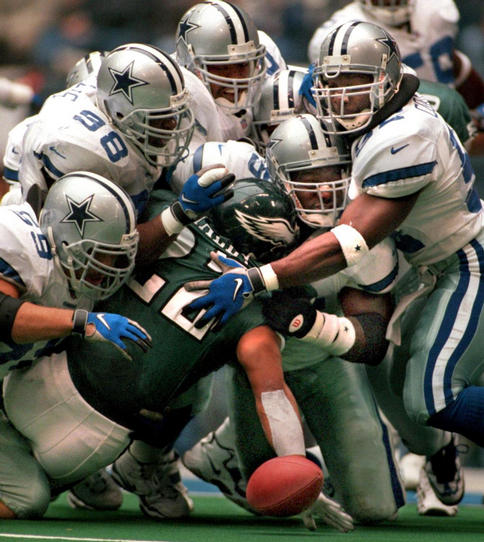Dear Sports Fan,
What is a fumble? When my friends watch football and there is a fumble, they turn to each other and solemnly say “the football.” What are they talking about and why do they enjoy this so much?
Thanks,
Frank
— — —
Dear Frank,
In football a fumble is what happens when an offensive player accidentally drops the ball or loses control of it because of what a defensive player has just done to him. As with so many elements of football there are a few technicalities to learn about the rules that govern fumbles. If a quarterback is in the act of throwing the ball and his arm is moving forward when he loses the ball or he is recovering from a fake pass, it is not a fumble. If a wide receiver has caught the ball but has not made a “football move” (note that this phrase can mean almost anything. It’s up to the refs to decide what it means, but it usually refers to some clear, willful act, like turning or dodging or diving,) losing the ball will not be a fumble. If there is a fumble, the ball is up for grabs by any player on the field as long as it stays in bounds.
The word fumble is so closely associated with football today as to almost be a technical term. I would have guessed that its use in common language was a result of the central importance of sport in our culture. I would have been wrong. The word fumble is old. It has its roots in the Norwegian and Sweedish word “fumla” or the Middle Low German “fummeln” from at least as far back as the 1500s when it’s meaning was close to the modern usage of the verb “to grope.” Its meaning has not changed too much in the last 500 years.
Although it’s hard to see it if you are not used to watching football, football is a game of precision, exact timing, and physical feats that have been practiced so many times that they become routine. A quarterback will take a three, five, or seven step drop backwards at the start of the play and then throw the ball to a receiver who’s route has been dictated by exactly how long it takes the quarterback to take to step backwards and throw. If the quarterback takes five instead of seven steps, the play will fail. On a running play, the movements of the five offensive linemen are tightly programmed so that one member of the line can push a defensive player back and to the left while his partner hits another to the right in order to open a tiny crack in time and space for the running back to sprint through.
A fumble is one of the rare moments in football when all that precision goes out the window and is replaced by complete mayhem and outcomes governed more by chance than skill. The shape of a football evolved to be more pointed at its ends so that it would fly faster and more accurately. It flies wonderfully but when it hits the ground, it behaves with the predictability of a drunk North Korean dictator with vertigo. When dropped or knocked out of a player’s hands, the football does not bounce, it squirts. This is probably why your friends attribute the craziness of a fumble to the ball. When a fumble happens, the ball is free; whoever picks it up captures possession for their team. Everyone wants it but it often seems as though the football is willfully evasive, unwilling to be recaptured now that it has experienced freedom. Players are told from a young age not to try to pick up a fumbled ball but over and over again they try, only to have it escape out of trembling hands.
A lot of the time it isn’t clear that anyone has recaptured the ball before there is a pile of five to ten players on top of one another with the ball underneath. These pile-ups are pretty crazy. As described in this NFL.com article:
When a football hits the ground, players are known to do whatever it takes to get it. Nothing is off limits. Eye-gouging. Crotch-grabbing. Biting. Kicking. Punching. Choking. All that’s missing are brass knuckles, steel chairs and other objects made famous by the grapplers in World Wrestling Entertainment.
According to stat gurus Football Outsiders, all the determination in the world doesn’t amount to much when it comes to recovering fumbles. What happens once the ball has been fumbled is completely random as shown by there being “no correlation whatsoever between the percentage of fumbles recovered by a team in one year and the percentage they recover in the next year.” On the other hand, causing a fumble is a highly prized skill among defensive players. So much so that you will often see defensive players give up an easy chance to tackle the player with the ball, instead attempting to punch the ball away. This is spectacular when it works but looks foolish when it doesn’t. Offensive players, particularly ones who handle the ball a lot, like quarterbacks and running backs are judged harshly for fumbling. A fumbling habit is the fastest way to be benched.
Football fans love the game for its precision but we can’t help loving the chaotic moment when the ball is fumbled and all the best plans of Giants and Jets…
Thanks for reading,
Ezra Fischer


Thanks for your informative articles. I have a new appreciation for football, having read your series. I also appreciate your metaphoric language and your humor!
Happy birthday!
Love,
Mies